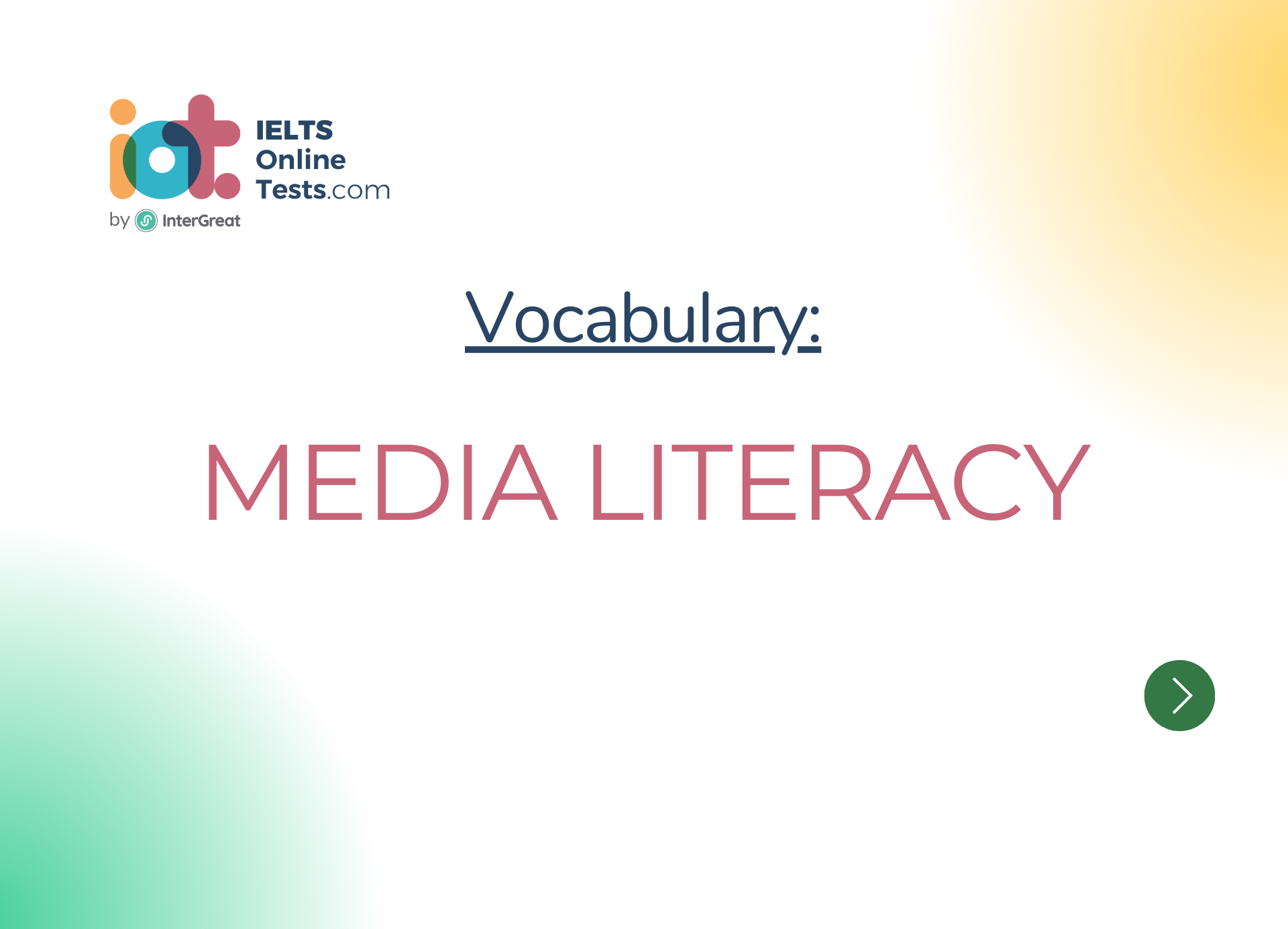
Media literacy
Here is a detailed explanation of vocabulary related to "Media Literacy" suitable for IELTS band scores 6.5-8.0:
Media Literacy:
- Definition: Media literacy refers to the ability to access, analyze, evaluate, and critically understand various forms of media, including print, digital, and broadcast.
Critical Thinking:
- Definition: The ability to analyze and assess information objectively and logically, considering different perspectives and evidence. In the context of media literacy, critical thinking helps individuals discern credible information from misinformation or biased content.
Information Literacy:
- Definition: Information literacy is the capacity to locate, evaluate, and effectively use information from various sources, including media. It involves the skills of discerning reliable sources and verifying information.
Media Bias:
- Definition: Media bias refers to the inclination or prejudice of media outlets to present information in a way that favors a particular perspective or group. Being media literate enables individuals to recognize and navigate bias in news and other media content.
Media Manipulation:
- Definition: Media manipulation is the deliberate alteration or distortion of information in media to influence public opinion. Media literacy helps individuals recognize manipulation techniques used in advertising or propaganda.
Fact-checking:
- Definition: Fact-checking is the process of verifying the accuracy and reliability of information presented in the media. Media literate individuals actively engage in fact-checking to ensure the credibility of news and claims.
Misinformation:
- Definition: Misinformation refers to false or misleading information spread unintentionally or with limited evidence. Media literacy equips individuals to identify and avoid sharing misinformation.
Disinformation:
- Definition: Disinformation is false information deliberately created and spread to deceive and mislead. Media literacy empowers individuals to discern disinformation and prevent its spread.
Media Literacy Skills:
- Definition: Media literacy skills include the ability to analyze and interpret media content, including images, videos, and written text. These skills help individuals critically engage with media messages.
Media Literacy Education:
- Definition: Media literacy education is instruction and programs aimed at teaching individuals how to critically assess and comprehend media messages. It is often integrated into school curricula.
Media Literacy Campaign:
- Definition: A media literacy campaign involves coordinated efforts to raise awareness and promote media literacy among the public, often initiated by organizations, institutions, or governments.
Media Literacy Advocate:
- Definition: A media literacy advocate is an individual or organization that actively supports and promotes media literacy initiatives to foster informed and critical media consumers.
Media Literacy Workshop:
- Definition: A media literacy workshop is an interactive session or training program that enhances media literacy skills, often conducted by experts or educators.
Media Consumption Habits:
- Definition: Media consumption habits refer to patterns and behaviors related to how individuals access and interact with media content, including their preferences and frequency of media usage.
Media Literacy Assessment:
- Definition: A media literacy assessment is the evaluation of individuals' media literacy skills and understanding, often used to measure the effectiveness of media literacy education programs.
Media Ethics:
- Definition: Media ethics are moral principles and standards governing the responsible use and production of media. Media literacy involves an understanding of ethical considerations in media.
Media Literacy and Democracy:
- Definition: The relationship between media literacy and democracy highlights how informed citizens who possess media literacy skills are essential for a functioning democratic society.
Media Literacy and Advertising:
- Definition: The study of how media messages and advertisements influence consumer behavior and choices. Media literacy enables individuals to recognize persuasive techniques in advertising.
Media Ownership:
- Definition: Media ownership refers to the control and ownership of media outlets by specific individuals, corporations, or groups. Media literacy involves an awareness of the impact of ownership on media content.
Media Literacy and Fake News:
- Definition: The study of strategies to identify and combat the spread of false or misleading information in media. Media literacy helps individuals distinguish between credible news and fake news.
Media Literacy and Digital Citizenship:
- Definition: Digital citizenship refers to the responsible and ethical use of digital technologies, including social media and online platforms. Media literacy promotes the development of positive digital citizenship skills.
Media Literacy and Privacy:
- Definition: The study of how media use and data collection can impact individuals' privacy. Media literacy helps individuals understand and protect their personal information in the digital age.
Media Consumption Patterns:
- Definition: Media consumption patterns are the typical ways in which individuals engage with media content, including preferences for specific platforms and content types.
Media Literacy and Media Literate Society:
- Definition: The concept of a media literate society emphasizes the importance of having a population that is well-informed, critical, and engaged with media messages to make informed decisions.
Media Literacy and Visual Communication:
- Definition: The study of how visual elements, such as images and graphics, convey meaning in media. Media literacy includes the ability to interpret visual communication effectively.
Media Influence on Public Opinion:
- Definition: The examination of how media content can shape and influence public perceptions and attitudes towards various issues. Media literacy involves understanding the power of media messages.
Media Literacy Advocacy Group:
- Definition: An advocacy group that promotes media literacy awareness and campaigns for media literacy education in schools and communities.
Media Literacy and Media Regulation:
- Definition: The exploration of media regulations and policies that govern media content and its distribution. Media literacy includes an understanding of media regulations' impact on information dissemination.
Media Literacy and Digital Footprint:
- Definition: The study of individuals' online presence and activities that leave a trace of personal information. Media literacy emphasizes the importance of managing and protecting one's digital footprint.
Media Literacy and Social Media Engagement:
- Definition: The examination of how individuals interact with and contribute to social media platforms. Media literacy involves understanding the role of social media in shaping public discourse.
By incorporating these vocabulary words into your studies and practice, you can enhance your language proficiency and be better prepared for the IELTS exam. Best of luck!




